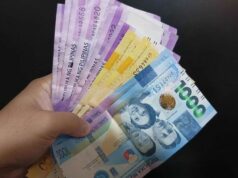Coronavirus fears push gov’t debt yields up as bondholders prefer cash
By Carmina Angelica V. Olano
Researcher
YIELDS ON government securities (GS) rose almost across-the-board last week as market players sold off their bonds due to the spread of the coronavirus disease 2019 (COVID-19) in the country.
On average, GS yields went up by 28.8 basis points (bps) week on week, according to the PHP Bloomberg Valuation Service (BVAL) Reference Rates as of March 13 published on the Philippine Dealing System’s website.
“Bondholders reduced risk and chose to hold on to cash given the uncertainties surrounding the COVID-19 pandemic,” Kevin S. Palma, peso sovereign debt trader at Robinsons Bank Corp., said in a mobile phone message.
“It has been an extreme roller coaster ride for the financial markets and the rest of the world [last] week. As the local stock market entered the bear market, government bonds followed suit and experienced a sell-off of its own,” he added.
Security Bank Corp. Chief Investment Officer for Trust and Asset Management Group Noel S. Reyes shared the same view. “Because of the community quarantine, [people] prefer to hold cash. The growth of spread in terms of COVID-19 patients in the Philippines escalated fast. The overall market sentiment was de-risking,” he said in a phone call.
Amid the increasing number of COVID-19 cases in the country, President Rodrigo R. Duterte announced on Thursday that the National Capital Region will be placed under a 30-day “community quarantine” wherein travel by land, domestic air and sea to and from Metro Manila will be banned from March 15 until April 14.
There were 111 confirmed COVID-19 cases in the Philippines as of March 14, with eight fatalities recorded.
Meanwhile, last week also saw sell-offs in the equity market, with the Philippine Stock Exchange index’s nearly 10% plunge last Thursday to its lowest since 2012 amid deepening fears over COVID-19.
At the secondary market on Friday, yields on Treasury bills (T-bills) rose from week-ago levels, except for the 364-day T-bill which saw a 6.5-bp decline to 3.654%.
The 91- and 182-day T-bills went up 6.6 bps and 2.4 bps to fetch 3.124% and 3.391%, respectively.
At the belly, yields on the two-, three-, four-, five-, and seven-year Treasury bonds (T-bonds) went up by 39.1 bps (4.122%), 44 bps (4.264%), 45.6 bps (4.351%), 45.2 bps (4.410%), and 42.8 bps (4.512%).
Yields on longer-term debt papers likewise climbed, with the 10-, 20- and 25-year T-bonds fetching 4.673%, 4.906%, and 4.896%, up by 45.2 bps, 27.5 bps, and 24.6 bps.
“[For this week,] yields might fluctuate as investors rush to raise cash due to risks to growth and weakening sentiment. Doubts on the efficacy of policy responses amid escalating coronavirus cases drove the sell-off for the past few days and is expected to put market on a defensive stance,” the First Metro Asset Management, Inc. said in an e-mail.
“Despite the recent pullback, we think that the BSP will take a proactive measure and further cut rates by another 25 bps in its upcoming meeting which should support renewed fall in yields from current levels,” it added.
Security Bank’s Mr. Reyes said to expect more market sell-off and volatility if the growth of infected cases continues to rise.
“On a positive note the BSP will continue to apply cushion to help stimulate the economy,” he added.
For Robinsons Bank’s Mr. Palma said, “Local yields may inch higher as selling pressure for local bonds may prevail…, but we may already see some bargain hunters cautiously come in once any developments come to light.”
As monetary authorities continue to assess the impact of the outbreak, Bangko Sentral ng Pilipinas (BSP) Governor Benjamin E. Diokno has said he “is not totally ruling out” cuts worth 50-75 bps this year, with a 25-bp cut on the table this week. The BSP’s Monetary Board is set to meet virtually on Thursday to discuss policy.



